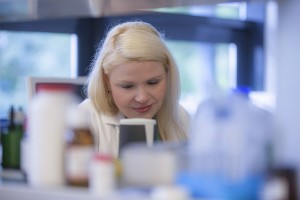Archived
Please note, this page may contain outdated information or subject matter.
 Neurofibromatosis type two causes tumours to develop in the nervous system, typically in the brain and spine. Although not cancerous, these can cause devastating symptoms. Dr Sylwia Ammoun hopes to develop a much-needed new treatment for this rare genetic disease.
Neurofibromatosis type two causes tumours to develop in the nervous system, typically in the brain and spine. Although not cancerous, these can cause devastating symptoms. Dr Sylwia Ammoun hopes to develop a much-needed new treatment for this rare genetic disease.
Around 40 people, most of them teenagers or young adults, are diagnosed with neurofibromatosis type two (NF2) each year in England. It’s caused by a gene defect, which can be inherited but can also happen by chance before birth. This results in the body being unable to produce a tumour-supressing protein called Merlin.
People with NF2 can suffer from as many as 20 to 30 tumours at any one time.
Those inside the head commonly cause hearing loss, tinnitus and balance problems, as well as facial pain and paralysis, speech impairment and swallowing problems. Sufferers are also at risk of developing cataracts that can lead to blindness. Spinal tumours cause back pain and often paralysis, and tumours that cause pressure on the brain stem and blood vessels can be life-threatening. Sadly symptoms tend to get worse over time and lives can be cut short.
Treatment options are currently limited. Surgery may be possible but can be high-risk and depending on where tumours are located, is sometimes just too dangerous.
Dr Sylwia Ammoun (pictured), of Plymouth University, has been studying tumour cells donated by people with NF2 and discovered it may be possible to treat them using existing drugs. Funding from Action is helping her to investigate further.
“We’ve found that certain sequences of DNA, which originally came from viruses that have inserted themselves into our chromosomes over millions of years and are normally inactive, become active within NF2 tumour cells,” says Dr Ammoun.
“We think the unusual activity of this DNA may cause these tumour cells to grow. We have shown that some drugs, which are used to treat viral infections, seem to block the action of this DNA and slow down the growth of tumour cells. We are investigating this further to see if we can develop a much-needed new drug treatment.
“We are immensely grateful to Action Medical Research for this vital grant which will help us to move closer to finding the best drug to deal with this pernicious and debilitating condition, which can rob children and young adults of quality of life at an early age,” says Dr Ammoun
